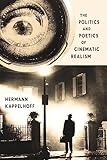The Politics and Poetics of Cinematic Realism / Hermann Kappelhoff.
Material type: TextSeries: Columbia Themes in Philosophy, Social Criticism, and the ArtsPublisher: New York, NY : Columbia University Press, [2015]Copyright date: ©2015Description: 1 online resource (280 p.) : ‹B›40 b&w photographs‹/B›Content type:
TextSeries: Columbia Themes in Philosophy, Social Criticism, and the ArtsPublisher: New York, NY : Columbia University Press, [2015]Copyright date: ©2015Description: 1 online resource (280 p.) : ‹B›40 b&w photographs‹/B›Content type: - 9780231170727
- 9780231539319
- 791.436581 23
- PN1995.9.P6 K275 2015
- PN1995.9.P6 K275 2016
- online - DeGruyter
- Issued also in print.
| Item type | Current library | Call number | URL | Status | Notes | Barcode | |
|---|---|---|---|---|---|---|---|
 eBook
eBook
|
Biblioteca "Angelicum" Pont. Univ. S.Tommaso d'Aquino Nuvola online | online - DeGruyter (Browse shelf(Opens below)) | Online access | Not for loan (Accesso limitato) | Accesso per gli utenti autorizzati / Access for authorized users | (dgr)9780231539319 |
Browsing Biblioteca "Angelicum" Pont. Univ. S.Tommaso d'Aquino shelves, Shelving location: Nuvola online Close shelf browser (Hides shelf browser)

|

|

|

|

|

|

|
||
| online - DeGruyter The Japan-South Korea Identity Clash : East Asian Security and the United States / | online - DeGruyter Saffron Shadows and Salvaged Scripts : Literary Life in Myanmar Under Censorship and in Transition / | online - DeGruyter Sovereignty : The Origin and Future of a Political and Legal Concept / | online - DeGruyter The Politics and Poetics of Cinematic Realism / | online - DeGruyter The Practices of the Enlightenment : Aesthetics, Authorship, and the Public / | online - DeGruyter Excellent Beauty : The Naturalness of Religion and the Unnaturalness of the World / | online - DeGruyter Happiness and Goodness : Philosophical Reflections on Living Well / |
Frontmatter -- CONTENTS -- PREFACE AND ACKNOWLEDGMENTS -- 1 POETICS AND POLITICS -- 2 BEFORE THE WAR -- 3 AFTER THE WAR -- 4 AFTER '68 -- 5 BEYOND CLASSICAL HOLLYWOOD CINEMA -- 6 A NEW SENSITIVITY -- NOTES -- BIBLIOGRAPHY -- INDEX -- Backmatter
restricted access online access with authorization star
http://purl.org/coar/access_right/c_16ec
Hermann Kappelhoff casts the evolution of cinema as an ongoing struggle to relate audiences to their historical moment. Appreciating cinema's unique ability to bind concrete living conditions to individual experience (which existing political institutions cannot), he reads films by Sergei Eisenstein and Pedro Almodóvar, by the New Objectivity and the New Hollywood, to demonstrate how cinema situates spectators within society. Kappelhoff applies the Deleuzean practice of "thinking in images" to his analysis of films and incorporates the approaches of Jacques Rancière and Richard Rorty, who see politics in the permanent reconfiguration of poetic forms. This enables him to conceptualize film as a medium that continually renews the audiovisual spaces and temporalities through which audiences confront reality. Revitalizing the reading of films by Visconti, Fassbinder, Kubrick, Friedkin, and others, Kappelhoff affirms cinema's historical significance while discovering its engagement with politics as a realm of experience.
Issued also in print.
Mode of access: Internet via World Wide Web.
In English.
Description based on online resource; title from PDF title page (publisher's Web site, viewed 02. Mrz 2022)


